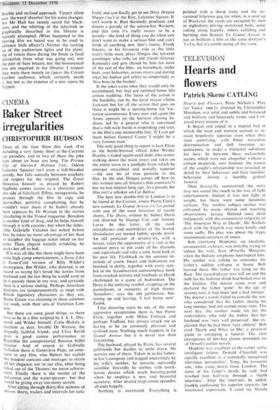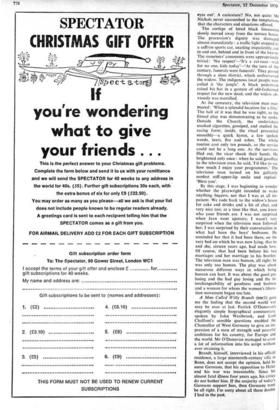TELEVISION
Hearts and flowers
Patrick Skene CATLING
Hearts and Flowers. Peter Nichols's 'Play for Today' (Bac1), directed by Christopher Morahan, was solid and subtle and balanced and brilliant and humanely ironic and I en- joyed every minute of it.
It began and ended in a nuptial bed in which the man -and woman seemed to re- main hopelessly separate even when they were contriving, with bitter masculine determination and dull feminine ac- quiescence, to make a frictional substitute for love. In between these melancholy scenes, which were not altogether without a certain desperate, sour humour, the nature of the couple's relationship was revealed in detail by their behaviour and their families' behaviour during a humbly genteel funeral.
Thus drastically summarised, the story may not sound like much in the way of light entertainment. Indeed it was not light in weight, but 'there were some luminous surfaces. The sombre subject matter was enlivened by many shrewd and touching observations. Jessica Mitford once dealt indignantly with the commercial vulgarity of 'The American Way of Death': Mr Nichols dealt with the English way more kindly and more sadly. His play was about the tragic uncommunicativeness of stoics.
Bob (Anthony Hopkins), an idealistic, unsuccessful architect, was irritably trying to seduce his wife, Jean (Priscilla Morgan), when the bedside telephone interrupted him. His mother was calling to announce his father's sudden collapse at home. Bob hurried there. His father was lying on the floor. The record-player was still on and the milk for his bedtime drink had boiled over in the kitchen. The doctor came over and declared the father 'gone'. At the age of seventy-two, it had been 'not a bad innings'. The doctor's words failed to console the son, who considered that his father, during his long innings, had not scored many runs. The next day, the mother made tea for the undertakers, who told the widow that her husband was 'very well preserved'.. She ex- plained that he had been 'very athletic'. Bob read 'Death and. What to Do', a practical guide to arranging a funeral. The alert perceptions of low-key gloom reminded me of Orwell's earlier novels.
Hopkins was excellent as the rather surly, intelligent failure. Donald Churchill was equally excellent as a nationally recognised television 'personality', Tony, the favourite son, who came down from London. The news of his father's death, he said, had reached him half-way through a 'depth interview'. After the interview, he added, frankly confessing his superior capacity for emotional expression, 'I cried my bloody eyes out'. A caricature? No, not quite; Mr Nichols never succumbed to the temptations that the characters and situations offered.
The cortege of hired black limousines slowly moved away from the terrace house. The procession's dignity was damaged almost immediately : a traffic light stopped it; a saffron sports car, snarling impatiently, cut in and out, behind and in front of the hearse. The mourners' comments were appropriately
trivial : respect'—`It's a rat-race—wait for no one, kids today'—`At the turn of the century, funerals were funerals'. They passed through a slum district, which embarrassed the widow. The indigenous local people now called it 'the jungle'. A black pedestrian raised his hat in a gesture of old-fashioned respect for the new dead, and the widow ob- viously was mortified.
At the cemetery, the television man mur- mured: 'What a splendid location for a film.' The hell of it was that he was right, as the filmed play was demonstrating as he spoke. Outside the Church, the undertakers smoked cigarettes, gossiped, and studied the racing form; inside, the ritual proceeded smoothly—a quick hymn, a few spoken words, tears, fire and ashes. The whole routine cost only ten pounds, so the service could not be a long one. As the survivors filed out, the vicar shook their hands. He brightened only once : when he said goodbye to the television man, he said, `I'd like to say how much I enjoy your programmes.' The television man turned on his gallantly modest stiff-upper-lip smile and replied: `Bless you'.
By this stage, I was beginning to wonder whether the playwright intended to make anything happen, not that I was at all im- patient. We rode back to the widow's house for cake and drinks and a bit of chat, and very nice too; at a time like that, you know who your friends are. I was not surprised when Jean went upstairs; I wasn't very surprised when the television man followed her; I was surprised by their conversation in what had been the boys' bedroom. He reminded her that it had been there, on the very bed on which he was now lying, that he and she, sixteen years ago, had made love. Of course, that had been before his two marriages and her marriage to his brother. The television man was human, all right; he was only too human. The play was about numerous different ways in which being
human can hurt. It was about the good guy losing and the bad guy losing and the in- terchangeability of goodness and badness and a woman for whom the women's libera- tion movement began too late.
A Man Called Willy Brandt (sad) gave me the feeling that the second world war
may be over at last. Patrick O'Donovan's elegantly simple biographical commentary. spoken by John Westbrook, and Lord Chalfont's sensible questions enabled the Chancellor of West Germany to give an im- pression of a man of strength and peaceful ambitions for his country, for Europe and the world. Mr O'Donovan managed to cram a lot of information into his script without ever straining it. Brandt, himself, interviewed in his official residence, a large nineteenth-century villa in Bonn, does not accept the opinion, held by some Germans, that his opposition to Hitler and his war was treasonable. Since his
almost fatal illness four years ago, his critics do not bother him. If the majority of today's Germans support him, then Germany must be all right. I'm sorry about all those doubts I had in the past.











































 Previous page
Previous page